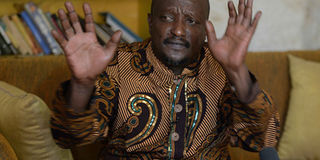WARAH: ‘Homonationalism’ could become a double-edged sword for African gays

PHOTO | AFP Kenyan author Binyavanga Wainaina gestures during an interview with the AFP on January 27, 2014, in Nairobi. One of Africa's most powerful writers and a founder of the Nairobi-based literary network Kwani, Wainaina published a story online earlier this month that announced his sexual orientation, entitled "I am a Homosexual, Mum". Homosexuality is outlawed in Kenya, although arrests are rare.
What you need to know:
- It is surprising that an increasing number of Kenyan homosexuals are coming out at a time when some African countries, notably Nigeria and Uganda, are passing legislation that will essentially criminalise homosexual activity.
- Anti-gay movements across Africa are claiming that homosexuality is “Western” and “un-African”, but, as a new book called Sexuality and Social Justice in Africa shows, the discussion around homosexuality on the continent is much more complicated than being just pro- or anti-gay.
Kenyan writer Binyavanga Wainaina’s sensational “coming out” last month will no doubt embolden other homosexuals to come out and speak about the discrimination they face, not just in law but in daily life. Indeed, shortly after Binyavanga’s bold admission that he was gay, the Goethe Institute and Native Intelligence released a book called Invisible that carries other coming out stories by Kenya’s gay community.
The editor, Kevin Mwachiro, says the book is about a section of society “that is denied the right to be themselves” and that it is “not about stirring up pity, but about telling the story about being gay in Kenya”.
It is surprising that an increasing number of Kenyan homosexuals are coming out at a time when some African countries, notably Nigeria and Uganda, are passing legislation that will essentially criminalise homosexual activity.
On the other hand, perhaps it is the very fact that these laws are being passed that has prompted African gay activists to step up their game and fight back.
Their struggle is supported by Western pro-gay lobbies that have pumped money into lesbian, gay, bisexual, trans-gender, and intersex (LGBTI in NGO-speak) communities worldwide, and which are pressuring their governments to pull aid out of countries that do not recognise homosexuals as equal citizens.
It is not surprising that President Yoweri Museveni failed to sign the homophobic law passed by Uganda’s Parliament recently, probably because he fears losing Western donor funding, which has been propping up his regime for years.
WESTERN CONCEPT
Meanwhile, anti-gay movements across Africa are claiming that homosexuality is “Western” and “un-African”, but, as a new book called Sexuality and Social Justice in Africa shows, the discussion around homosexuality on the continent is much more complicated than being just pro- or anti-gay.
The author, Marc Epprecht, says that while there may appear to be a clash between liberal Western and conservative African values, the situation on the ground is much more complex. For instance, countries with the most gay-friendly legislation, such as South Africa, are also notorious for their tolerance for “corrective rape” against lesbians.
And while African churches condemn the West for promoting homosexuality on the continent, they fail to recognise that Christianity came to Africa via European missionaries and was later propagated by American evangelists. Indeed, as Wainaina has stated in his interviews, fundamentalist evangelical Christianity imported from the United States is among the leading causes of homophobia on the continent.
Moreover, the obsession with sexuality has diverted attention from pressing issues such as land grabs, corruption, and inequality. Epprecht notes that this obsession also conveniently diverts attention from heterosexual “secrets” arising from patriarchal privilege, such as the “sugar daddy” phenomenon and the rape of sexual minorities in the name of “African values”.
Like HIV/Aids, which was, and still is, perceived as mainly a gay (and African) disease despite mounting evidence that it is prevalent among heterosexuals, the noise around homosexuality is clouding other realities.
For instance, while advocating gay rights, Western governments fail to admit that their policies in Africa may, in fact, be doing more harm than good and causing the suffering of millions. Issues of social and economic justice have thus taken a back seat at a time when Western and Asian countries are laying claim on Africa’s resources through dubious deals and opaque loans.
Epprecht cautions against the growing phenomenon of “homonationalism” (a term coined by scholar Jasbir Puar) — that is, “taking excessive pride in the achievements of gay rights activism in the West and showing chauvinistic regard for the Western model of outness”.
He says that homonationalism may actually lead to a backlash against perceived beneficiaries of Western support, which could inadvertently make the life of African pro-gay activists much harder.
Africans also have to be cautious about the tendency of the Western media to portray African governments as homophobic and, therefore, “backward”.
It is reminiscent of the stereotypes that Africans have been subjected to for centuries. By portraying Africans as homophobic and irrational, the liberal Western media makes it easy for those who look down at or patronise Africans to find a following.





